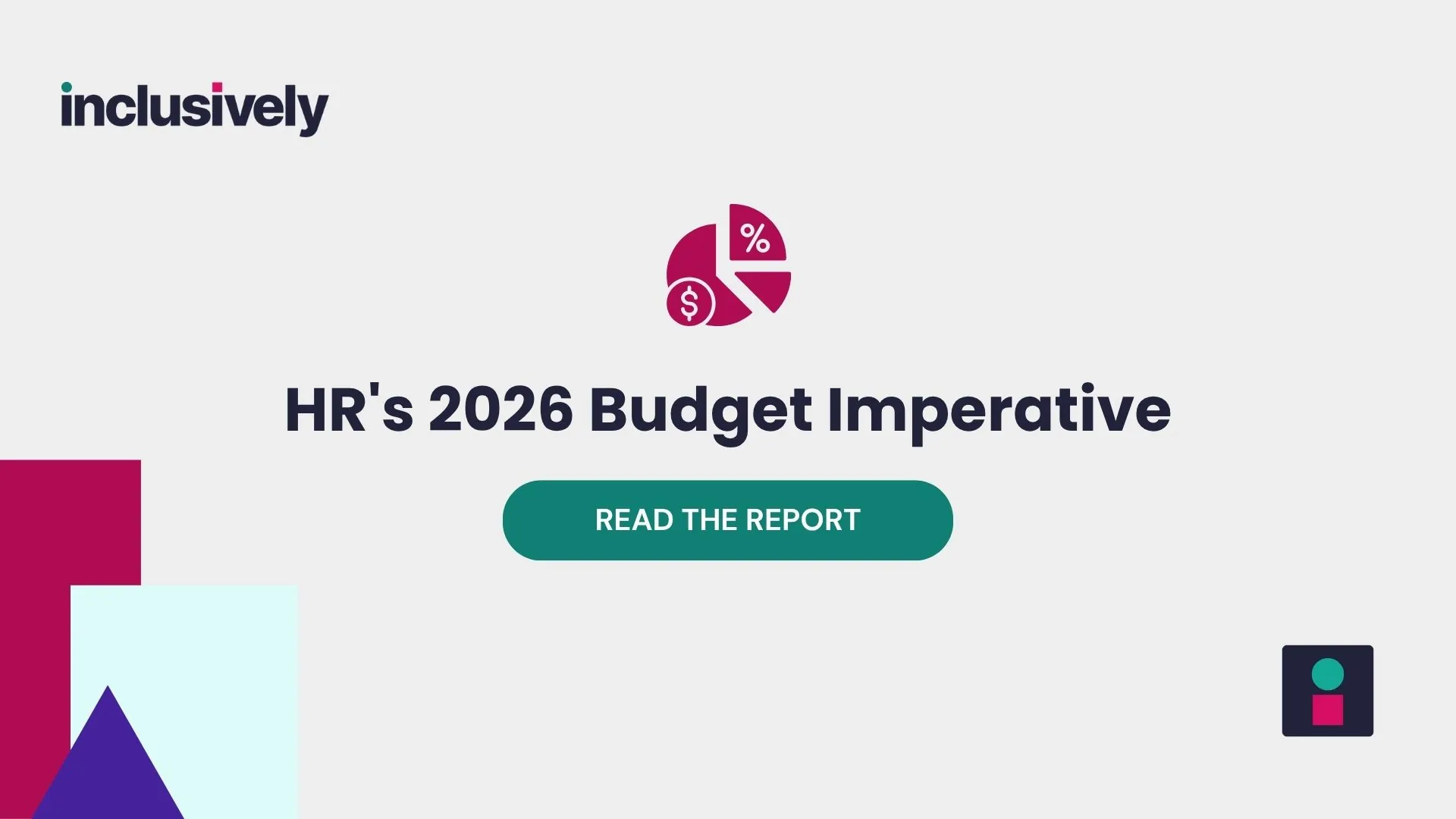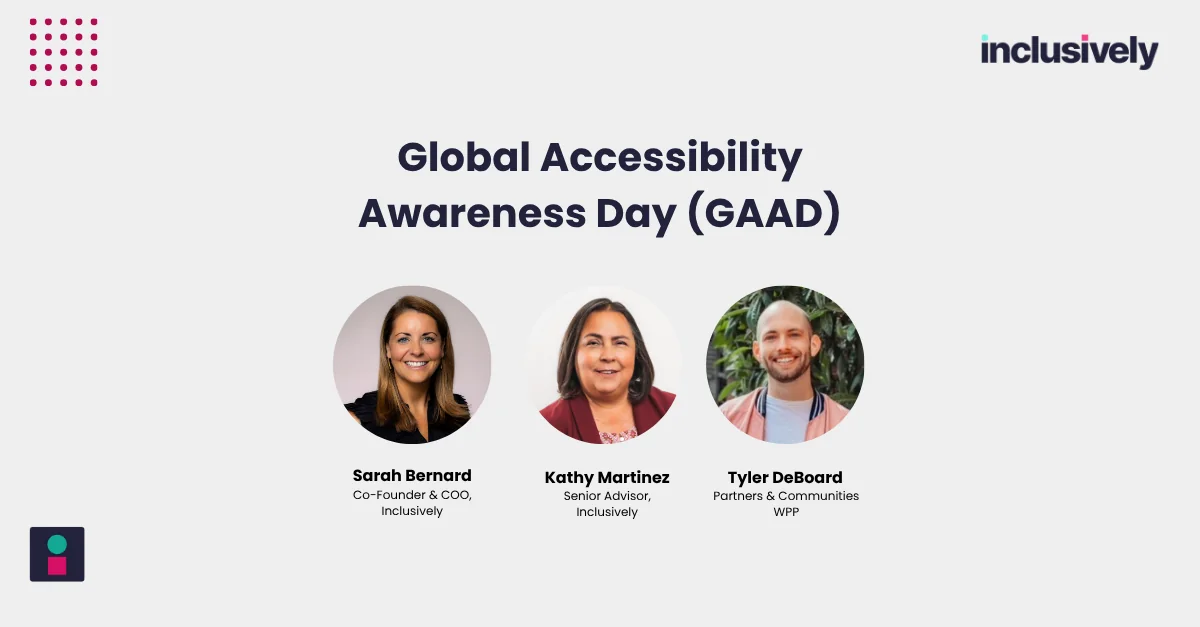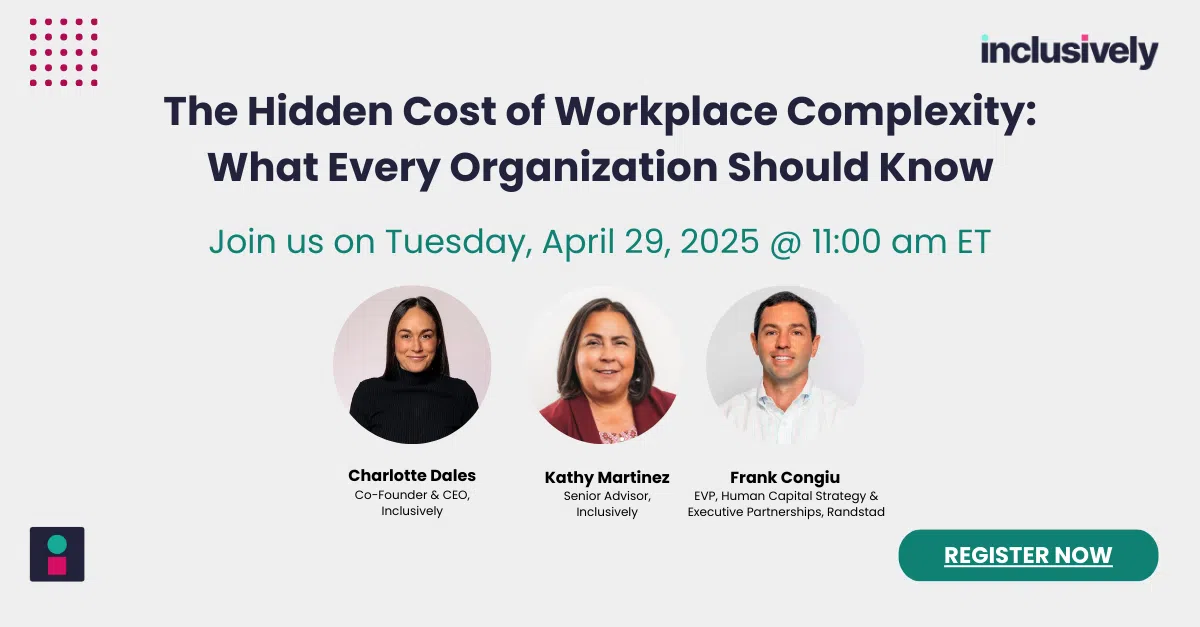Webinar
Revolutionizing Employee Experience: Harnessing AI to Streamline the Accommodation Process
Thank you for filling out our form. Please enjoy the webinar!
Webinar Transcript
Christina Mallon 0:00
Welcome to our webinar on Revolutionizing Employee Experience: Harnessing AI to Streamline the Accommodation Process. I’m your host Christina Mallon, and I’m delighted to have you all here today. Our panelists are expert in the field. They’re Charlotte and Ryan from Inclusively. Together, we’ll explore the possibilities of AI and shaping more inclusive employee experience. So before we dive into the discussion, let’s do some introductions. I’m Christina, I’m a disabled inclusive designer, mom, head of inclusive design at Microsoft and advisor to Inclusively. I’m joined by our amazing panelists, Charlotte, Ryan, why don’t you tell our listeners a little bit about yourselves?
Charlotte Dales 0:42
Hi, Christina. So I am the CEO and one of the co-founders of Inclusively and I started this company a couple of years ago, after seeing my cousin become the first licensed facialists in the state of Florida with Down syndrome and noticing that her employer only had to make some very slight adjustments to her working environment for her to be productive and successful. And so I wanted to figure out how can we use technology to just make it really, really, really simple and easy for large employers to accommodate people’s unique requests at scale across the disability spectrum. So from you know, autism and Down syndrome to stress, anxiety, depression, and everything else in between.
Christina Mallon 1:24
Thanks so much. All right. On to you, Ryan.
Ryan Aylward 1:28
Hi, I’m Ryan, our CTO here at Inclusively formerly the founding engineering CTO at Glassdoor. And what attracted me Inclusively was really it shares a lot of similar values and mission. They’re both really mission driven. And they’re both really focused on helping job seekers and employees to be more successful in their work. And I’m also a father with a son with some learning differences. So it’s also kind of spoke to my heart about how we can help people like that.
Christina Mallon 1:53
Well, thank you so much for both sharing your stories. Charlotte, this first question is for you, I’d love to understand what the traditional recruitment accommodation processes are. And what you think the future of recruitment accommodation is.
Charlotte Dales 2:06
So I think to understand where we’re heading, we first need to take a closer look at where we’ve been, traditionally, recruitment and accommodation processes, they’ve often been very reactive, compliance driven, costly, and highly manual, and just kind of a one size fits all approach. So, you know, imagine being someone who’s neurodiverse, and knowing that you perform better in a one on one setting, and you’re given the option to request an accommodation during the application process. So you want to request something like preferring not to have a panel interview, and then waiting for weeks for this simple request to get approved, approved. So most likely, by the time it is approved, the hiring decision has been made before you’ve even gotten the chance to interview. But in recent years, what we’ve seen is a shift. So all this really is how do you personalize an experience a hiring experience and employee experience? How do you do that at scale, and I really believe personalization at scale is the future of work. And modern workplaces are already starting to evolve because of COVID. Because of new generations now making up over 50% of the workforce, these employees Gen Z and millennials, they grew up in an education system that accommodated them for their learning disabilities, for mental health challenges, etc. And they’re expecting the same thing from their employers, which just even more emphasizes the need for flexibility and a focus on individual well being and not just an awareness campaign to promote employee wellness or kind of a feel good initiative. I think companies that are able to address the event, individual needs of their employees in a way that’s scalable and doesn’t disrupt their business or ability to make money. They’re starting to understand that to attract and retain top talent, and to get the most productivity out of their talent. They really need to adapt. And I think what’s even more exciting is that this doesn’t just have to be something for people with disabilities at the heart of this evolution is the principles of universal design. And these principles, promote the creation of products, environments, and practices that are accessible and usable by everyone. And so by embracing universal design, companies can drive diversity, equity and inclusion, but they can also just create a better, more productive experience for all employees.
Christina Mallon 4:39
I definitely agree that universal design is better design for all and really, thank you so much for sharing these insights. So let’s shift it to Ryan. Ryan, can you talk about what AI is and its role in modern workforce?
Ryan Aylward 4:53
Yeah, I mean, as you mentioned, the real game changer in the industry right now is AI. And it’s not just about automation, it’s not just about making things more efficient or data driven, it really does allow for this personalization that Charlotte spoke of in a very scalable way, which usually those two things are at odds with each other. But personalization can happen at scale. And it does this by becoming a personal assistant for you to help every employee find the accommodations that are right for them, by learning from all the other employee interactions you’ve had in the past and kind of learning from people’s preferences. And what’s really cool about this, is it doesn’t just lead to these great experiences, it also can minimize unconscious bias within an organization in both the hiring and the accommodation process.
Christina Mallon 5:36
Well, you’ve really highlighted the transformational potential of AI, can you share an example of AI has led to step in improving employee experiences, as you discussed, you know, reducing bias or enhancing personalization?
Ryan Aylward 5:49
Yeah, I mean, one really compelling example of this is the product, we built an Inclusively product called Retain. And it it really does achieve all these things. It’s smart enough to make recommendations for on accommodations for individuals without having to talk to a person. And doing that means they don’t have to disclose their personal details or having to self identify as having a disability. So that drives privacy helps with privacy. And it also reduces that bias I spoke of that can arise during that accommodation process. It really levels the playing field for employees, makes it easier for them to access the support they need, without the fear of judgment, or discrimination that sometimes comes along with it.
Christina Mallon 6:28
Wow, I really wish they had Retain when I first entered the workforce being somewhat the disability. So thanks so much for giving us the top line, Ryan. Charlotte, can you go a little bit deeper into Retain since such a new product? I think you know, our viewers want to learn more.
Charlotte Dales 6:42
Yeah, so we started this product, after just seeing a need over and over again, with our existing employers. So, you know, we were helping people through our hiring product, new candidates, helping them deduce what accommodations they can ask for, and then shipping their application alongside those requests over to employers in a way that was easy for them to digest and provide those accommodations in real time. But what we started noticing was, you know, many of our employers were telling us that they needed this for their existing workforce, self ID rates are still really, really low, even though we know about 30% of the existing workforce already meets the federal definition of having a disability. It’s about 2-5% of people that actually report this to their employer, which means it’s a huge percentage of the population that is not set up to be as productive or successful as they could be. And so you know, enter Retain. We’ve built an AI tool that’s designed to understand accommodation needs, both from the perspective of an employee, not necessarily knowing what to ask for, and the employers perspective of how do I always know what we’re able to do what we can offer, we suggest creative solutions. And we leverage a lot of the products, benefits, and services that companies already have that they’re just not realizing can actually tie back to accommodations that people are asking for. We’re centralizing that and streamlining this process. So just imagine getting a quick tailored accommodation recommendation with just a few clicks in our platform, and knowing exactly where to go, and how to obtain that request really quickly. Of course, there’s always going to be, you know, some requests that require a true interactive accommodation process. But the majority of these things are already things companies are doing so both for an employee to figure out what they can even ask for, for help to be more productive, and for the employer to be able to reduce tons of redundant conversations and automate a lot of the process and just create a better, more efficient employee experience. So we don’t just stop at accommodations, we’re offering this holistic approach to employee experience. So you know, from onboarding to sort of sort of ongoing updates, and you know, resubmitting accommodations annually, so that you’re kind of always up to date on what you need, based on different life changes, and enabling employers to provide these things in real time without a ton of resources needing needed to be able to do so.
Ryan Aylward 9:27
And one of the, we worked, we created this product using really proprietary datasets, unique to Inclusively and then we train the data ongoingly. So as more interactions happen on our platform, we our system gets smarter and smarter over time. And as Charlotte alluded to universal design, one of the really powerful things about Retain is it really does normalize the whole idea of accommodations. These aren’t just for people with medical diagnosis, abilities, lots and lots of people benefit from accommodations that are tailored to their unique needs. And by using AI we personalize these accommodations and allow organization to create this more inclusive and equitable work environment where employees really feel valued and supported.
Christina Mallon 10:08
This sounds great. I think this is going to really help so many companies scale and employees be happier. Can you tell us more about what the future looks like for Retain and Inclusively?
Ryan Aylward 10:18
Yeah, the future is super exciting. As we talked about Retain enables this really more personalized employee experience where employees have really customized accommodation support. Where that leads to is employees being more effective in their job every day, which then of course, translates into higher job satisfaction. And higher job satisfaction means employees stay at their company longer. So retention for employers go up. That’s the name of the product. And the cool thing is, all of this happens without a really heavy burden on the HR team. As AI takes on more of these responsibilities, the HR team employee experience teams will evolve. They don’t have to do as much the administrative tasks that they often get sucked into doing. And it allows them to focus on higher level tasks, things like strategy, and really more of the human side of HR. It’s really powerful. I guess one last thing to highlight, I guess, anytime we’re talking about AI, you know, with AI comes some privacy concerns, you know, that becomes really paramount in our in our business to make sure we think about that holistically. And we have to make sure that you know, it doesn’t actually introduce its own biases. So those are really important things for us. We take that very seriously. Make sure that we practice responsible and ethical AI. Yeah,
Christina Mallon 11:31
Thanks for noting that I know a lot of companies are really thinking about okay, how’s our privacy there? How are we ensure that we are ethical and responsible? So, Charlotte, what are your insights on involving roles in HR? And can you elaborate, you know, how these professionals can effectively transition into these new, more strategic roles alongside AI?
Charlotte Dales 11:54
Yeah, so I think in considering the future prospects of AI driven, you know, employee experiences, candidate experiences, there’s several key areas to explore. So first, when we’re talking about hiring, we’re looking at how AI can revolutionize the recruitment process. It has the potential to match candidates with jobs more effectively by analyzing not just their qualifications, but also their soft skills within the organization. But as you know, Ryan alluded to, it’s also ensuring that these algorithms are not are actually screening more people in instead of screening them out. And I think this tailored approach can significantly enhance retention. And I think the focus will become a lot more strategic on the hiring side, focusing on not just how fast can I fill this role, but how long are they staying? And what am I doing on you know, the other side of this interaction at the front door to ensure that I’ve set this candidate up to stay at the company for a really long time. And then secondly, as AI continues to advance, it’s just essential just to discuss how roles within HR and employee experience will involve. So AI can take on more responsibilities, and HR professionals will get to find themselves focusing on more strategic decision making and less routine administrative tasks, as Ryan alluded to, and I think this, the shift can lead to a more strategic and impactful HR function within organizations, which is often been viewed as something you can, you know, turn on and turn off based on your hiring needs. It’s a more crucial part of the organization and really trying to understand how you can get the most out of your employees so that, you know, they are set up for success, and they’re happy and they’re satisfied, and they’ll retain and they’re the most productive. They’re even more productive than you know, historically in the past. But Ryan also alluded to, it’s really crucial to acknowledge the potential challenges that come with AI. Data privacy is just a top concern and organized organizations need a lot of, you know, robust strategies to just ensure that data is stored ethically and securely. Because this is pretty sensitive employee data. And additionally, there’s the risk of over reliance on AI where human judgment and empathy are undervalued. So to mitigate these challenges, organizations should invest in comprehensive AI training and just establishing clear ethical guidelines and maintain a balance between human and AI decision making processes. And I think by doing so they can harness the full potential of AI driven employee experiences while also addressing these important concerns.
Christina Mallon 14:44
Yeah, I love that you cover you know what the potential can be, but also the limitations of AI. In closing, let’s recap the key takeaways from today’s discussion. So we’ve explored the evolution of employee experiences, the transformational role of AI, and the exciting potential of Retain by Inclusively. Listeners, now it’s your turn to take action! I encourage all employees to explore Retain further. Request a demo and see firsthand how AI can revolutionize your employee experiences. I’d like to extend my heartfelt thanks to our panelists Charlotte and Ryan, for sharing their expertise and insight today. As we wrap up, remember that innovation and inclusivity are the driving forces behind the future of work. Let’s embrace these changes, adapt to new possibilities and together create a workplace that is truly inclusive and empowering for all. Thank you.

Charlotte Dales (She/Hers)
Co-Founder & CEO
Success Enablers
Remote Work

Christina Mallon (She/Her/Hers/Disabled)
Director of Inclusive Design, Microsoft
Accessible Work Environment
Extended Time
Captioning
Notetaker

Ryan Aylward (He/Him/His)
Interim CTO
Success Enablers
Accessible Work Environment
Remote Work


